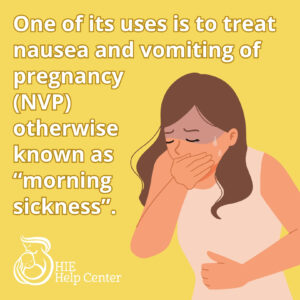Ondansetron, or the brand name Zofran, is a powerful antiemetic agent, or drug that is used to treat nausea and vomiting.
It has commonly been used to treat nausea and vomiting resulting from chemotherapy, surgery, anesthesia, and radiation therapy (1). It is also used to treat nausea and vomiting of pregnancy (NVP, otherwise known as “morning sickness”).
How common is morning sickness?
Morning sickness is very common; seven in ten women reported experiencing it during the first three months of pregnancy (2). Zofran’s use in combating morning sickness has increased from about 1% of women in 2000 to about 10% in 2011.
Zofran and birth defects
With the help of the Center for Disease Control and Prevention (CDC), the Slone Epidemiology Center at Boston University conducted a study on whether ondansetron affects the likelihood of a baby having birth defects (3). The cohort study found no significant difference in fetal and pregnancy outcomes between the 176 women who took ondansetron and the 352 women who did not (4).
The study found that, for the majority of specific birth defects studied, there wasn’t an increased risk associated with first trimester use of Zofran.
However, there were “modest increases” in risk of cleft palate and renal agenesis-dysgenesis associated with Zofran use in the first trimester (3). These findings showed that further study was necessary to rule out birth defects caused by the use of Zofran during the first trimester.
A 2013 cohort study done in Denmark and published in The New England Journal of Medicine also found that use of Zofran in pregnancy (not just in the first trimester, though the majority of women who use the drug take it during the first trimester) was not associated with an increased risk of preterm delivery, low birth weight infants, small for gestational age infants, any major birth defects, stillbirth, or spontaneous abortion (4). Researchers granted that there could have been other confounding factors that affected the results, such as the fact that women with nausea and vomiting during pregnancy are generally less likely to have a spontaneous abortion. They say that further studies are necessary to get a full read on the effects of the drug.
Zofran and maternal heart issues
The FDA issued a warning in September 2011 about possible associations between Zofran and certain maternal heart issues, including QT prolongation and torsade de pointes. These are abnormal heart rate measurements that could indicate tachycardia or arrhythmias.
Because of these potential hazards, it is recommended that Zofran only be used after other methods of combating nausea and vomiting have been tried.
Other nausea/vomiting treatment options
 According to the American Pregnancy Association there are several other supplements that may help treat morning sickness. These include:
According to the American Pregnancy Association there are several other supplements that may help treat morning sickness. These include:
- Sea bands and Relief bands: Devices that use acupressure points to relieve nausea.
- Vitamin B6: This vitamin has been shown to reduce nausea, though it must be taken only in small amounts. Temporary nerve damage can result from taking more than 100 mg of Vitamin B6 a day.
- Nip the Nausea: Anti-nausea drops with the main ingredient of ginger, a natural treatment for nausea.
- PregEase: A natural supplement that uses Vitamin B6 and ginger to fight nausea.
- Preggie Pops: Lollipops that harness essential oils and plant botanicals that treat nausea.
Disclaimer
HIE Help Center is not run by medical professionals or associated with a medical facility. The above information should not be taken as medical advice. Always contact a medical professional when you are experiencing any of the above symptoms or any other concerning symptoms of pregnancy.
Sources
- Koren G. (2012). Motherisk update. Is ondansetron safe for use during pregnancy?. Canadian family physician Medecin de famille canadien, 58(10), 1092–1093.
- Ondansetron for Treatment of Nausea and Vomiting of Pregnancy and the Risk of Specific Birth Defects. (n.d.). Retrieved May 1, 2023, from https://journals.lww.com/greenjournal/Abstract/2018/08000/Ondansetron_for_Treatment_of_Nausea_and_Vomiting.16.aspx
- Parker, S. E., Van Bennekom, C., Anderka, M., Mitchell, A. A., & National Birth Defects Prevention Study. (2018, August). Ondansetron for Treatment of Nausea and Vomiting of Pregnancy and the Risk of Specific Birth Defects. Retrieved March 22, 2024, from https://www.ncbi.nlm.nih.gov/pubmed/29995744
- Pasternak, B., Svanstrom, H., & Hviid, A. (n.d.). Ondansetron in Pregnancy and Risk of Adverse Fetal Outcomes | NEJM. Retrieved March 22, 2024, from https://www.nejm.org/doi/full/10.1056/NEJMoa1211035




Leave a Reply
You must be logged in to post a comment.